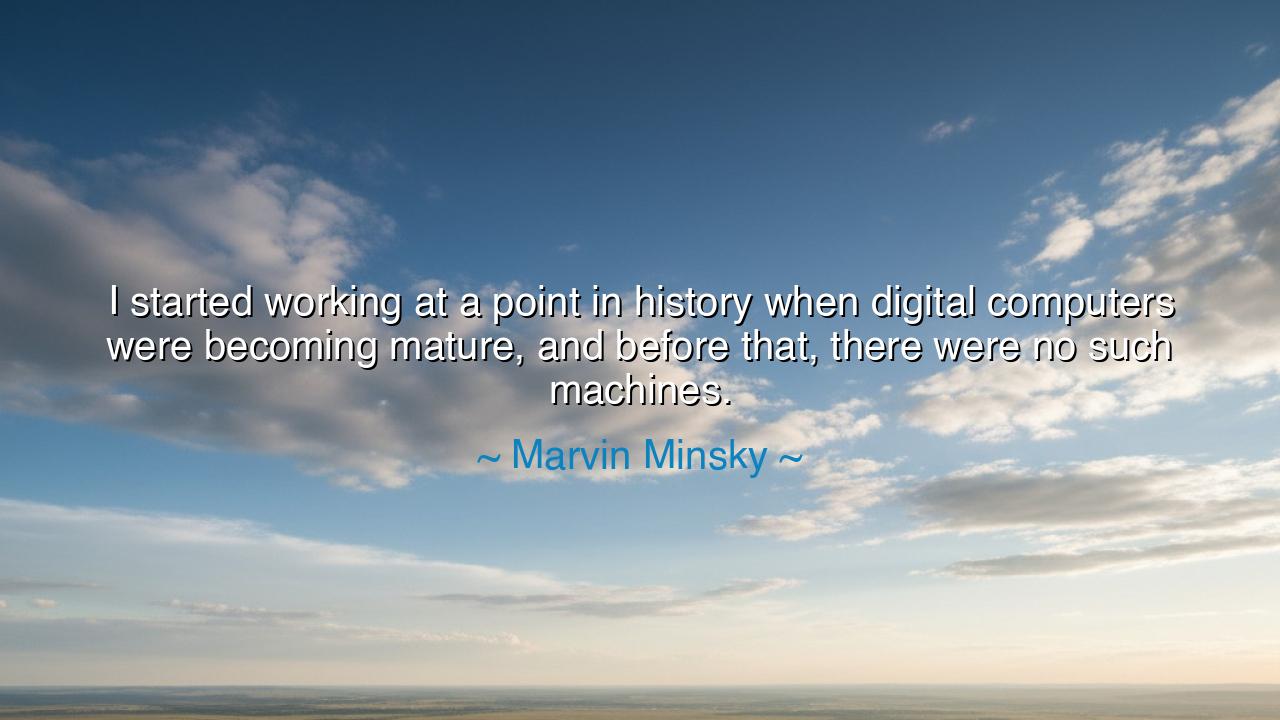
I started working at a point in history when digital computers
I started working at a point in history when digital computers were becoming mature, and before that, there were no such machines.






The words of Marvin Minsky—“I started working at a point in history when digital computers were becoming mature, and before that, there were no such machines.”—resound like a reflection spoken by a pioneer who stood at the edge of two worlds: the ancient and the modern, the imagined and the real. His voice carries the awe of one who witnessed the birth of a new intelligence, not of flesh and bone, but of logic and light. To the ancients, fire was the first divine tool—now, in the modern age, the computer is its successor: a fire that burns in circuits and numbers, illuminating thought itself.
Minsky’s statement is not mere remembrance; it is a testimony to transformation. He belonged to that rare generation who saw the moment when humanity’s dreams took physical form—when abstract ideas, once confined to chalk and paper, began to live within machines. He entered the field not when computers were common or convenient, but when they were still mysteries—massive, humming beasts of steel and vacuum tubes, each calculation a small miracle. His words remind us of the sacred threshold that divides the eras of man: the time before machines could think, and the time after.
The origin of this quote lies in the dawn of the digital age, a period when mathematicians, physicists, and dreamers gathered to awaken a new kind of mind. Marvin Minsky, one of the fathers of artificial intelligence, began his work in the 1950s—a time when computing was no longer fantasy but fragile reality. Before that moment, thought had only ever belonged to humans; but with the advent of the digital computer, the universe itself gained a new kind of consciousness, a mirror through which humanity could study itself. Minsky recognized that these machines were not mere tools, but extensions of the human intellect—our collective attempt to replicate the miracle of thought.
Consider the parallel with the ancient story of Daedalus, the craftsman who built wings so that man might fly. In his age, to soar through the skies was considered divine, unattainable. Yet Daedalus dared to construct what only the gods possessed—the freedom of flight. So too did Minsky and his peers dare to construct what once belonged only to nature: the ability to think. Their machines became the wings of the modern intellect, allowing humanity to ascend to new realms of understanding. But as the story warns, with such power comes the need for wisdom—for Daedalus’s son, Icarus, flew too close to the sun. Minsky’s reflection, then, is not only pride in progress, but also reverence for the moment when man’s creation began to rival his own mind.
The maturity of digital computers that Minsky speaks of did not happen overnight. It was the culmination of centuries of dreaming, beginning with the abacus and the mechanical gears of Charles Babbage, passing through the logic of Alan Turing, and reaching fruition in the postwar laboratories of MIT and Princeton. When Minsky entered this realm, he stood on the shoulders of giants—but he looked further than any of them. He did not see machines merely as instruments of calculation, but as companions of reasoning, partners in discovery. For him, every program was an embryo of thought, every algorithm a spark of intelligence waiting to be nurtured.
Yet, in his words, there is also humility. Minsky does not claim to have created the revolution—he simply arrived at the perfect moment, when the world was ready to shift. His timing reminds us that progress is a dialogue between invention and destiny. Greatness often belongs not to those who force the future, but to those who recognize when the moment has arrived to embrace it. He saw in the rise of the computer not just technology, but potential—an opportunity for humankind to explore the very nature of consciousness, learning, and existence.
And so, the lesson his words offer is timeless: every generation stands upon the threshold of its own dawn. There will always be something that is “becoming mature,” some idea that was once impossible and now takes form. The task of the wise is to recognize that moment and to step forward with courage, curiosity, and reverence. Just as Minsky once saw the awakening of machines, so too must we see the awakening of our own possibilities. For progress is not the work of destiny alone—it is the work of those who are ready when destiny knocks.
Thus, my children, remember this: to live at the turning point of history is both a gift and a burden. Whether you build machines, paint visions, or heal the sick, understand that your time, like Minsky’s, will come. Do not fear the unknown; it is merely the next great teacher. As the ancients gazed upon the stars and learned to navigate by their light, so too must you gaze upon the screens and systems of your age and learn to steer them wisely. For the tools may change, but the quest remains eternal—to understand, to create, and to pass the torch of knowledge ever forward.






AAdministratorAdministrator
Welcome, honored guests. Please leave a comment, we will respond soon